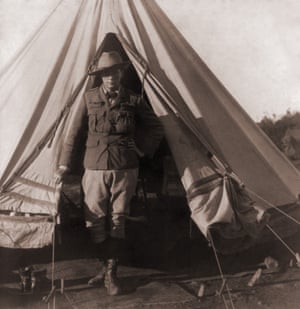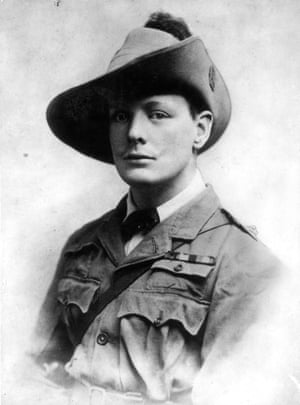
Candice Millard’s account of the young Churchill’s daring involvement in the Boer war sheds light on the politician and the conflict.
“There has been a great deal too much surrendering in this war,” wrote Winston Churchill in 1899. He was only 24 at the time but the war in question, against the Boers, was the fourth he had attended. (He had also written and published two books.) He had narrowly escaped being shot in Cuba. He had reported on the war in Sudan. On British India’s north-west frontier he had gone into battle against the Pashtun, making himself conspicuous on a white pony bought, as he candidly told his brother, because it would “attract attention” if he rode about on it “when things looked a little dangerous


Toxic ambition? Winston Churchill heading back to Britain on board a steamer in Durban, South Africa, as a reporter during the Boer war.
Attention, according to Candice Millard, was what Churchill was after. He was already aiming for the highest political office. To achieve it, he needed first to cover himself in military glory. “This is a pushing age,” he wrote to his mother, and push he diligently did. Bystanders were repelled and impressed. “I don’t like the fellow,” wrote Lt Gen Sir George White, “but he’ll be prime minister of England one day.” Churchill believed he was entitled to the best of everything. Aged 15, after a train journey, he wrote, “I won’t travel 2nd again, by Jove.” He lost his first election but, lacking a parliamentary seat, he spoke out for war from
Attention, according to Candice Millard, was what Churchill was after. He was already aiming for the highest political office. To achieve it, he needed first to cover himself in military glory. “This is a pushing age,” he wrote to his mother, and push he diligently did. Bystanders were repelled and impressed. “I don’t like the fellow,” wrote Lt Gen Sir George White, “but he’ll be prime minister of England one day.” Churchill believed he was entitled to the best of everything. Aged 15, after a train journey, he wrote, “I won’t travel 2nd again, by Jove.” He lost his first election but, lacking a parliamentary seat, he spoke out for war from
the steps of his birthplace, Blenheim Palace
.
Churchill as a reporter for the Morning Post during the Boer war. Photograph: Everett/Rex/Shutterstock
Millard’s book tells of just one episode in his life. Churchill himself has recounted it, and so have other participants, but it makes a gripping story, and this version casts an interestingly oblique light on Churchill’s personality, and on a traumatic war.
For Millard, Churchill (whose mother was American) is not an embodiment of the British bulldog breed. Rather, he is one of those ambitious men – boiling over with surplus energy and devoted to a toxic ideal of honourable manliness – who abounded on both sides of the Atlantic at the beginning of the 20th century. Millard’s Churchill resembles Theodore Roosevelt, the subject of her earlier book.
For her, the history of the Boers, too, is full of American echoes. They were pioneers, dissidents who left Europe. Dragging their wagons together at night for protection, they pushed ever further into the interior of what seemed to them a God-given and empty continent, “devastating entire populations” of indigenous people and “taking over vast swaths of their land”. They rode their farms gun in hand. They had no standing army. They were all Lone Rangers. And, like many Americans, they bitterly resented the British who patronised them and competed with them, and who had undermined their right to own slaves.
Immersing herself in her period’s mindset, Millard has picked up its prose style. Her sentences are sumptuously upholstered. When she means “British army”, she says “most revered and reviled fighting force in the world”; when she means “coal”, she says “the black historic remains of swamp and bog vegetation”. She piles up adjectives. Houses are “breathtaking”. London is “glittering”. Women are “blindingly beautiful”. Enemies are “irresistible and terrifying”. When not gushing about “stunning” events, “dramatic” encounters and “devastating” defeats she is capable of cod-Churchillian orotundity. None of this verbiage, though, gets in the way of her story
She follows the ponderous progress of General Redvers Buller, “the Steamroller”, southward. By the time Buller, with Churchill in his train, reached Cape Town, Ladysmith was besieged. Churchill, supposedly a non-combatant reporter, took part in an ill-planned escapade involving an armoured train. Reminding himself of Napoleon’s dictum: “When one is alone and unarmed, a surrender may be pardoned,” he allowed himself, despite his earlier views on surrendering, to be taken prisoner.

Churchill as a reporter for the Morning Post during the Boer war. Photograph: Everett/Rex/Shutterstock
Millard’s book tells of just one episode in his life. Churchill himself has recounted it, and so have other participants, but it makes a gripping story, and this version casts an interestingly oblique light on Churchill’s personality, and on a traumatic war.
For Millard, Churchill (whose mother was American) is not an embodiment of the British bulldog breed. Rather, he is one of those ambitious men – boiling over with surplus energy and devoted to a toxic ideal of honourable manliness – who abounded on both sides of the Atlantic at the beginning of the 20th century. Millard’s Churchill resembles Theodore Roosevelt, the subject of her earlier book.
For her, the history of the Boers, too, is full of American echoes. They were pioneers, dissidents who left Europe. Dragging their wagons together at night for protection, they pushed ever further into the interior of what seemed to them a God-given and empty continent, “devastating entire populations” of indigenous people and “taking over vast swaths of their land”. They rode their farms gun in hand. They had no standing army. They were all Lone Rangers. And, like many Americans, they bitterly resented the British who patronised them and competed with them, and who had undermined their right to own slaves.
Immersing herself in her period’s mindset, Millard has picked up its prose style. Her sentences are sumptuously upholstered. When she means “British army”, she says “most revered and reviled fighting force in the world”; when she means “coal”, she says “the black historic remains of swamp and bog vegetation”. She piles up adjectives. Houses are “breathtaking”. London is “glittering”. Women are “blindingly beautiful”. Enemies are “irresistible and terrifying”. When not gushing about “stunning” events, “dramatic” encounters and “devastating” defeats she is capable of cod-Churchillian orotundity. None of this verbiage, though, gets in the way of her story
She follows the ponderous progress of General Redvers Buller, “the Steamroller”, southward. By the time Buller, with Churchill in his train, reached Cape Town, Ladysmith was besieged. Churchill, supposedly a non-combatant reporter, took part in an ill-planned escapade involving an armoured train. Reminding himself of Napoleon’s dictum: “When one is alone and unarmed, a surrender may be pardoned,” he allowed himself, despite his earlier views on surrendering, to be taken prisoner.

Young Winston in circa 1899 during his service in the South African Light Horse
Captivity was “the greatest indignity of my life”. Two others planned an escape. Their brother officers selflessly helped them. Churchill hijacked the plan, insisting on coming too. They didn’t want him – he was “unfit, too famous and he couldn’t keep a secret” – but couldn’t say no to him. The escape was bungled. He went ahead on his own, and then made his way alone across hundreds of miles of enemy territory to the coast. It’s a thrilling journey, and Millard tells it with gusto. The jumping on to a moving train. The despair out on the veldt. The nights hiding in a mine with rats gnawing his candles. The men who risked their lives to help him (they were rewarded with gold watches). The long journey hidden among bales of wool on a freight train. The arrival at the British consulate in Lourenço Marques, where the doorman told the filthy stranger that no, the consul would not be free to see him until the following day, and the wildly over-entitled young aristo bellowing with rage in the courtyard until the consul came down and asked him his name.
In a war from which nothing but dispiriting news was coming back, Churchill’s “daring” escape was a gift for the London newspapers. They were full of “Mr Churchill’s heroism”, of the “gallantry”, “coolness and pluck” of this “young man of brilliant promise”. The following year he stood again for parliament and won his seat. He said “personal popularity arising from out of the late South African war carried me in”. Despite his famous later assertion that surrendering was something the British would never do, it did his own career no harm.
Captivity was “the greatest indignity of my life”. Two others planned an escape. Their brother officers selflessly helped them. Churchill hijacked the plan, insisting on coming too. They didn’t want him – he was “unfit, too famous and he couldn’t keep a secret” – but couldn’t say no to him. The escape was bungled. He went ahead on his own, and then made his way alone across hundreds of miles of enemy territory to the coast. It’s a thrilling journey, and Millard tells it with gusto. The jumping on to a moving train. The despair out on the veldt. The nights hiding in a mine with rats gnawing his candles. The men who risked their lives to help him (they were rewarded with gold watches). The long journey hidden among bales of wool on a freight train. The arrival at the British consulate in Lourenço Marques, where the doorman told the filthy stranger that no, the consul would not be free to see him until the following day, and the wildly over-entitled young aristo bellowing with rage in the courtyard until the consul came down and asked him his name.
In a war from which nothing but dispiriting news was coming back, Churchill’s “daring” escape was a gift for the London newspapers. They were full of “Mr Churchill’s heroism”, of the “gallantry”, “coolness and pluck” of this “young man of brilliant promise”. The following year he stood again for parliament and won his seat. He said “personal popularity arising from out of the late South African war carried me in”. Despite his famous later assertion that surrendering was something the British would never do, it did his own career no harm.
No comments:
Post a Comment